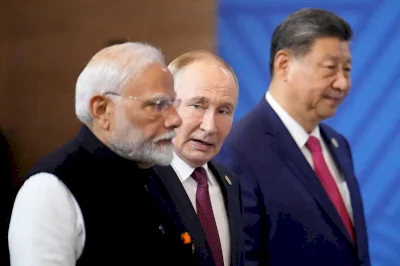
China Showcases Its Regional and International Alliances at the 'Shanghai Summit'

SadaNews - China is showcasing its regional and international alliances by hosting a group of Eurasian leaders this Sunday for the Shanghai Cooperation Organization summit, followed by events commemorating the end of World War II.
Chinese President Xi Jinping will welcome Russian President Vladimir Putin, Indian Prime Minister Narendra Modi, and North Korean leader Kim Jong Un at this international event, which offers an alternative proposal to Western governance in the world and discusses prominent issues such as the Taiwan and Ukraine crises. The Shanghai Cooperation Organization meeting is set to be held on Sunday and Monday in Tianjin, northern China, with leaders arriving to participate starting Saturday. Some leaders will extend their visit to China to take part in a series of events showcasing Beijing's military strength, including a massive military parade expected on Wednesday, marking the 80th anniversary of the end of World War II.
Putin... The Guest of Honor
According to the Kremlin, the Russian president will be the "guest of honor" at the military parade in Tiananmen Square in Beijing. He will also hold political, trade, and security talks with Xi and participate in the Shanghai Cooperation summit. Yuri Ushakov, the Kremlin's foreign policy aide, told reporters that Putin will visit China, Russia's largest trading partner, from August 31 to September 3, noting that such a four-day trip by the Russian leader is extremely rare. The first two days will be dedicated to the Shanghai Cooperation Organization summit taking place in Tianjin. Ushakov added that Putin is expected to proceed to Beijing after that, where he is anticipated to hold talks with Xi and attend a military parade in Tiananmen Square to celebrate the anniversary of the end of World War II. Ushakov stated that Putin will attend as the "guest of honor" and will sit to Xi's right, while North Korean leader Kim Jong Un will sit to Xi's left.
Ushakov clarified that Putin will also hold several bilateral meetings with other leaders, including Indian Prime Minister Narendra Modi, Iranian President Masoud Barzakhian, and Turkish President Recep Tayyip Erdoğan. He added that a meeting with the North Korean leader has yet to be confirmed but is under discussion. The Russian delegation will include several senior officials, including Foreign Minister Sergey Lavrov, Defense Minister Andrei Belousov, Central Bank Governor Elvira Nabiullina, CEO of Gazprom Alexey Miller, and heads of major Russian banks and companies. Ushakov confirmed that three documents related to Gazprom are set to be signed in China, but he refrained from providing further details on the matter. Three Russian sources told Reuters prior to the visit that trade between Russia and China, which rose to record levels after the war in Ukraine isolated Moscow, is now experiencing a downturn, a trend that Putin is seeking to address.
Modi and Xi... A Complicated Relationship
In addition to Putin's visit, Narendra Modi's participation is notable, especially as it marks his first trip to China since 2018. This comes days after the United States imposed new tariffs on Indian exports in response to New Delhi's purchase of Russian oil.
China and India, the two most populous countries in the world, are engaged in a struggle for influence in South Asia. A deadly military clash occurred along their border in 2020. However, improved relations began to emerge in October when Modi and Xi met for the first time in five years during a summit in Russia. Lim Tai Wei, an East Asia specialist at Soka University in Japan, stated that "China will do everything it can to court India, particularly by leveraging the trade tensions between New Delhi and Washington." Recently, China and India announced the resumption of direct flights between them, the revival of talks on disputed borders, the reissuing of tourist visas, and the enhancement of trade exchanges. However, disputes remain, as noted by Lim Tai Wei. Modi was not among the foreign leaders that Beijing announced would attend the military parade on September 3.
Shanghai Summit
About 20 leaders are expected to participate in the Shanghai Cooperation Organization summit, which includes 10 full member states, along with several observer and partner countries.
The Shanghai Cooperation Organization was established in 2001, aiming to create a balance with Western organizations, and enhance cooperation in politics, security, anti-terrorism, and trade. In the face of what Beijing perceives as "Western hostility" regarding Taiwan and Ukraine, Xi and Putin view the Shanghai Cooperation Organization as a platform to bolster their influence, according to analysts quoted by the French News Agency.
Lizzie Lee, a researcher at the US-based Asia Society Policy Institute, predicted that the summit would yield tangible results. She told the French agency that "the Shanghai Cooperation Organization operates on consensus. When there are countries with deep disagreements on core issues, such as India with Pakistan or China with India, this inevitably limits ambitions." She added that Beijing wants above all to prove its ability to gather such completely different leaders, and that global governance "is not subordinate to Western dominance." In presenting the summit, China condemned American "hegemony" and considered the Shanghai Cooperation Organization a beacon of "stability" amid the global unrest.